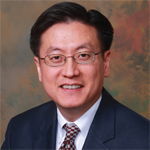
iQoncept/shutterstock.com
Many rheumatologists chose the profession because they wanted to delve more deeply into rheumatic diseases than internal medicine calls for.
“For most, this level of specialization is sufficient and worthy of a lifelong devotion and commitment,” says S. Sam Lim, MD, MPH, associate professor, Medicine and Epidemiology, Emory University School of Medicine, Atlanta. “However, some rheumatologists may find that they have an even deeper interest in a specific condition or group of conditions. Perhaps this was [apparent] all along—a result of a prominent condition in one’s community or a personal experience. In any case, the common result is that a passion has been stirred up that can’t be satisfied otherwise.”
Dr. Lim chose lupus as his specialty because it captured his attention the first time he learned about it in medical school. “I was fascinated by its multi-systemic features, chronic state and, particularly, how it afflicts mostly minority women in the prime of their lives,” he says. “Like many rheumatic conditions, lupus is an amazing juxtaposition of issues—autoimmunity, women’s health and health disparities. There seems to be no end to related areas in which I can devote myself further.”

Dr. Lim
Peter A. Merkel, MD, MPH, chief, Division of Rheumatology, and professor, Medicine and Epidemiology, University of Pennsylvania, Philadelphia, has a specialty niche in vasculitis and scleroderma. His interest in these conditions began during his rheumatology fellowship under the direction of excellent clinical mentors. “My interest and expertise grew with the expansion of my research portfolio,” he says. “Now, I see the full spectrum of patients with both sets of diseases and conduct an extensive number of clinical and translational research projects focused on them.”
Like Dr. Merkel, N. Lawrence Edwards, MD, MACP, MACR, vice chair and professor of medicine, University of Florida, and chair, Gout and Uric Acid Education Society, University of Florida, Gainesville, Fla., chose his specialty, gout and hyperuricemia, after working in the laboratories of world-renowned gout and hyperuricemia researchers, Drs. Bill Kelley and Irving Fox, during his rheumatology fellowship at the University of Michigan. “The exposure and association to these two gout pioneers made the decision easy for me; I fed off of their passion,” he says.

Dr. Merkel
Jonathan Samuels, MD, RhMSUS, assistant professor of medicine, NYU Langone Medical Center, New York, who focuses on osteoarthritis (OA) and musculoskeletal ultrasound, only started pursuing these subdisciplines after he became an attending physician at NYU Langone. “I enjoyed them enough to pursue them both clinically and in research,” he says.
For OA, Dr. Samuels first assumed the leadership role in recruiting and following patients for the division’s clinical trials in this disease, and ongoing observational studies funded by his chair’s grants from the National Institutes of Health.
Follow your passions. ‘If you do, you will become the best at what you do & will earn a reputation as a specialist in that field.’ —Dr. Arnold
When he attended his first course to learn rheumatology-directed musculoskeletal ultrasound in 2007, the use of ultrasound in the domestic ultrasound community was in its infancy. “Within a few years, after practicing and attending more courses, I began using it in my daily practice and clinical research collaborations,” Dr. Samuels says. “Since then, I have been teaching rheumatology ultrasound courses nationwide, and developed a curriculum for our fellowship trainees.”

Dr. Edwards
Unlike most rheumatologists, Erin L. Arnold, MD, partner, Orthopaedics and Rheumatology of the North Shore, in Skokie, Ill., grew up with rheumatology in her blood because her father was a rheumatologist.
“A lot of my interest in rheumatology came from watching my dad care for his patients,” says Dr. Arnold. “As a fellow 15 years ago, some earlier data for diagnostic ultrasound started coming out in the field of RA. I flew with my dad to Europe to learn how to do diagnostic ultrasound, and then began following the field and its application to rheumatoid arthritis (RA) and inflammatory RA.” Today, her specialty niche includes inflammatory arthritis, RA, psoriatic arthritis, ankylosing spondylitis and gout.
Choosing Your Niche
In general, individuals who work in medicine seem to get the most reward and provide the greatest impact and benefit to the patients they treat if they focus on something that greatly interests them and that they care deeply about. “I would encourage other rheumatologists to follow their passions,” Dr. Arnold says. “If you do, you will become the best at what you do and will earn a reputation as a specialist in that field.”

Dr. Samuels
When you are establishing your niche, Dr. Arnold says you have to find ways to be involved in patient care that are multi-dimensional. She has such a strong interest in inflammatory arthritis that she has become intimately involved with the Rheumatology Research Foundation by serving as a donor and speaking on the Foundation’s behalf to other potential donors and the media, when necessary. “This impacts patients because they see that they have a partner and advocate for this disease, and someone who can give advice and care about their illness,” she says.
If you want to specialize, but a niche isn’t jumping out, Dr. Edwards suggests looking over the entire spectrum of rheumatic diseases, physiologic processes, treatment approaches and patient care venues and focusing on the niche that speaks to you the most.
Then, learn the history of the niche. “If it’s still appealing to you, then read everything that is published on the topic and get to know the current experts in the field,” Dr. Edwards says.

Dr. Arnold
Dr. Samuels brings up another point to keep in mind. “While it is important to consider pursuing the aspect of rheumatology that most interests you, you should also pay attention to diseases and sub-disciplines that have not received enough emphasis and support in your institution or local community,” he says. “The latter may make it easier to establish and build a reputation as an expert within a niche. Another approach would be to find a niche that already exists with a more senior physician or investigator. [That way], you might have access to a large clinical or research database [or active cohort] and [be able to] make your own mark with another investigation. In this scenario, a good mentor might facilitate your development.”
Creating a Niche
If you move forward with establishing a niche of your own, you need to become a true student of the disease and a real expert. “Only study and seek to specialize in diseases for which you are truly fascinated and enjoy evaluating; see a lot of patients along with an established senior expert, and, if possible, see patients at a program that specializes and participates in research of that disease,” Dr. Merkel says.
For 12 years, Dr. Arnold worked with her father in a practice comprising 80 orthopedic surgeons and 10 rheumatologists. “There were not a lot of rheumatologists, so we saw a large variety of patients. Over the years, patients with certain therapies and diagnostics excited me,” she recalls, so she started limiting the other types of patients she would see.
In June 2014, Dr. Arnold and her father started their own practice. Initially, the practice served all rheumatology patients. But recently, they began limiting new patients to only those with RA, OA and other forms of inflammatory arthritis. “The key is to slowly limit the [number] of patients you see with other illnesses,” she says. The duo also created an environment that complements their interests, which includes diagnostic ultrasound, an infusion center and an exercise facility. These are all essential in caring for patients with inflammatory arthritis.
Dr. Samuels says it’s important to tell your colleagues at your institution about your clinical or research interests, as well as other physicians in your region by visiting their offices. “You can solicit referrals this way, and also put yourself in a position to give both lay talks to the community, professional talks to other physician groups and grand rounds at medical centers,” he says.
Dr. Lim strongly advises having at least one mentor. One of his mentors has been a leader in lupus care and research, and ran a lupus clinic at her institution for many years. “If you don’t have a mentor in the specific area of interest, you may still find one in another disease condition or field,” he says. “There are also many universal issues to starting any specialty niche. A career mentor can also help [you] navigate the more practical issues related to academic or practice advancement.”
Marketing Your Practice to Patients
As part of establishing your niche, you’ll need to market your specialty to potential patients. “The best people to promote your practice are your existing patients,” Dr. Arnold says. “If you take good care of them and understand their needs, patients will do your marketing. The longer you’re in practice, the more patients will promote it for you.”
Dr. Lim also says that building your patient base is key. An effective way to do this is to develop patient-centered resources. One example would be to foster the development of a patient support group that meets in your clinic or somewhere nearby. Disease-specific organizations are often active in various conditions. “You can quickly establish a relationship by volunteering to serve on an organization’s medical advisory board and speak at their patient forums,” he says.
Other crucial marketing strategies are to create a website that promotes your specialty and be active on social media. Additionally, list yourself as a provider of certain conditions on disease-focused websites, such as www.gouteducation.org.
Advertising through a variety of channels may work well, too, Dr. Lim says. You can purchase space on patient advocacy newsletters or in email blasts. Other traditional methods, such as targeted mailings, are good, too.
Promoting Your Practice to Physicians
Just as referrals from patients are invaluable, so are referrals from physicians. Dr. Arnold writes a letter to every patient’s primary care physician after a visit. “We want them to be aware of what we’re doing and thinking,” she says. “Many physicians have told us that they really appreciate this.” In addition to keeping the primary physician updated on the patient, it’s a great way to get referrals.
Getting referrals isn’t really any different from the approach used in a general practice, Dr. Lim advises. However, the advantage of having a specialty practice is that you can offer more disease-specific resources and management approaches.
Dr. Samuels also suggests writing review articles (or pursuing original research) about conditions in your niche, and presenting them at professional conferences.
“By speaking at community events and research-oriented conferences, as well as interacting frequently with orthopedic surgeons, I quickly built up my clinical volume and referral base for OA cases,” he says.
The Rewards of Having a Specialty Practice
Tremendous changes are happening in healthcare advancements—that no one had anticipated. In light of this, offering subspecialty care can be quite beneficial. “This allows you to be creative and engaged, and attentive to the newest advances in the literature,” Dr. Arnold says. In addition, “It’s really satisfying to know that you’re delivering the highest quality care.”
Dr. Lim concurs. “A specialty practice affords the opportunity to immerse yourself into a particular condition and become an expert in that area clinically,” he says. Also, “you get to know the patient experience in greater depth, which translates into an enriched clinical expertise. You can also establish stronger relationships with patient advocacy organizations and even industry and governmental organizations as a result.”
For Dr. Samuels, the most rewarding advantage of a specialty practice is having the ability to develop a cohort that can be used for research projects.
Challenges of Having a Niche
Dr. Arnold feels fortunate to work in a region with a lot of healthcare providers. If she was the only rheumatologist in town, having a specialty practice would be a challenge because it would be heart wrenching to turn away patients who may not have anywhere else to go.
When new patients outside of her specialty areas call in now, the receptionist will always say something like, “Dr. Arnold refers patients with this type of condition to this doctor.” Therefore, they don’t feel rejected or unaccepted.
Final Thoughts
If you decide to have a practice with a specialty niche, your heart must be in it. There are many ways to become highly educated on a topic and many ways to share your expertise. These efforts will surely attract patients and referring physicians, alike.
Karen Appold is a medical writer in Pennsylvania.
Market Your Niche
- Ask your patients for referrals;
- Develop patient-centered resources;
- Establish a patient support group or invite one to meet in your clinic or somewhere nearby;
- Create a website that promotes your specialty;
- Be active on social media;
- List yourself as a provider for certain conditions on disease-focused websites;
- Volunteer for a disease-specific organization;
- Write articles about your area of specialty; and
- Speak at conferences.


